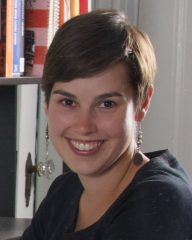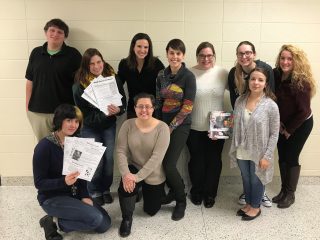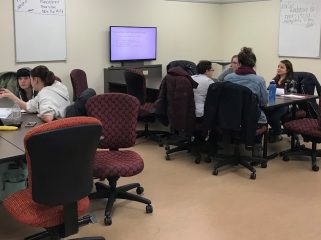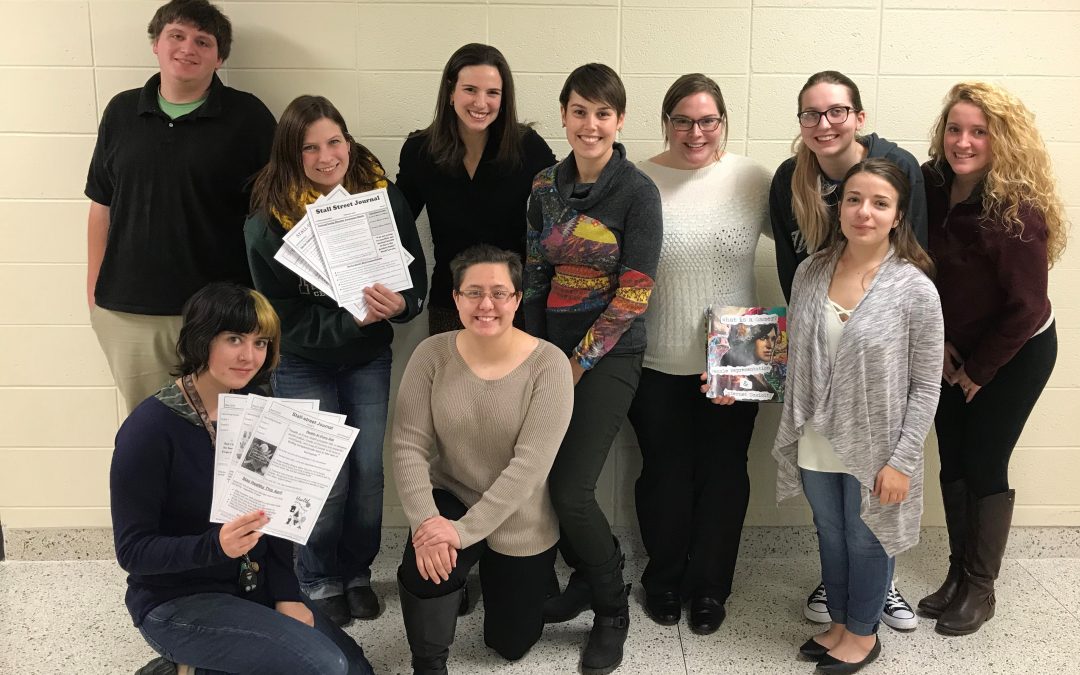 As a newcomer to the University of Wisconsin Oshkosh in May 2017, professor Maria Novotny has wasted no time implementing the first steps towards a new professional writing minor program within the English department.
As a newcomer to the University of Wisconsin Oshkosh in May 2017, professor Maria Novotny has wasted no time implementing the first steps towards a new professional writing minor program within the English department.
Novotny earned her doctorate in rhetoric and writing from Michigan State University in May 2017, where she taught several professional writing classes. Novotny used the model of student-community involvement that called on project-based learning to teach students about engaging a campus audience.
“Teaching project-oriented collaborative courses, I saw first-hand how students valued experiences in which they could take concepts learned from professional writing and apply them to their own local campus community. I really wanted to model that same type of learning here at UWO,” Novotny said.
Following her arrival at UW Oshkosh, Novotny began planning for the professional writing minor program by first running a pilot class; English 387: Digital Rhetoric in Health and Medicine. The class ran during the fall 2017 semester with the intent that it would serve as the cornerstone for the professional writing minor.
“Digital Rhetoric is a frequent ‘backbone’ course in any professional writing curriculum, and I was eager to introduce students—many who were new to professional writing at large—to the core theories and areas of study derived from that field of inquiry,” Novotny said.
An important component of the course was the community involvement aspect. Through collaboration with the UW Oshkosh Women’s Center and the university’s Student Health Center, students were given the opportunity to increase campus health literacy by applying digital rhetoric theories they learned in class to real-life campus center initiatives.
“Faced with dwindling operating budgets for these centers, our partnership with them aimed to provide free assistance to further their causes and availability to students on campus,” Novotny said. “The projects that we created for these two centers were established based upon the center’s needs and students really enjoyed creating projects that they knew both centers really wanted and needed.”
The small class of students was broken into four groups with each group curating a set of “deliverables” that focused on specific campus issues staff at the centers identified as high priorities.

UW Oshkosh students Alyssa Herman, an English major from Omro who graduated in December, and Jasmine Knoblach, a junior English major from Oshkosh, worked in conjunction with the Women’s Center to create a zine, a small-circulation, self-published online magazine that brings awareness to the inaccurate and harmful stereotypes surrounding female video game players. Check out the publication.
Junior English major Nicole Adams, of Oshkosh, and senior accounting major Griffin Reese, of Oshkosh, also worked with the Women’s Center creating a “social media toolkit,” which is a campaign that uses social media to communicate information related to their central issue of stalking. January is National Stalking Awareness Month, so the toolkit includes text and photograph ideas that can be used by the Women’s Center throughout the month. This team also created a brochure that details the important points of the campaign and will be distributed when students return from break in February.
Senior English major Ali Moon, of Neenah; and Maddy Vasseau, of De Pere, a December graduate who majored in human services leadership, partnered with the Student Health Center to also create a “social media toolkit” that “contained a different topic for each month that focused on the themes of reducing risk and encouraging healthy habits in college. Each month and theme contained photos and facts, as well as helpful hints and tips that the Student Health Center can post on various social media platforms,” Novotny said.
The fourth team, Katie Flynn, a senior in English and women’s studies from Neillsville who graduated in December, and Asher Erickson, a sophomore English and Japanese studies major, also worked with the Student Health Center to create a “digital toolkit” and a monthly bathroom stall newsletter. Newsletter topics were centered around body positivity with themes, including National Eating Disorder Awareness Month; Healthy at Every Size; body shaming; and stress.

Upon completion of the projects, Juliana Kahrs, promotion coordinator of the Student Health Center, expressed appreciation for the students’ hard work.
“The communication toolkits will be utilized in our health promotion dissemination plans this coming spring and fall semester, and they can be modified from year to year while still maintaining the overall structure,” Karhs said. “The students developed creative, sustainable, and cost-effective public health materials, and I hope they enjoyed this process.”
The academic and community partnership that Novotny fostered through her class is one that campus centers hope to hold onto.
“This was a fantastic opportunity for students to learn professional skills, as well as to contribute to their campus community,” Kahrs said. “Along with sustaining this partnership with Dr. Novotny, we certainly hope to work with other classes in the future.”
Learn more:

